60 People, 60 Stories
Fulfilling hope
By Wang Zhuoqiong (China Daily)
Updated: 2009-09-30 06:26
When Zhang Shengli completed third grade at 10, he was the most educated person in his village in Laiyuan county of Hebei province.
|
 Educator Zhang Shengli from Hebei province is doing his part to expand children's learning opportunities. [Qi Peiran]
|
But his father was physically ill and his mother suffered from a mental illness. They were too poor to support his studies any longer. Zhang had to cut firewood for two years to survive.
| ||||
One day, Zhang finally decided to write to a local official who had visited his village.
Zhang's letter, which spoke of his longing to study, moved the official and was passed on to the visiting researchers of the China Youth Development Foundation.
All this happened in 1989, when international studies found that one in four dropouts worldwide was a Chinese student.

So to put more rural students back in schools, the foundation was considering a program - Project Hope.
Zhang's letter of hope could not have been more timely, because he was subsequently chosen as the country's first beneficiary of the foundation's new project.
By last year, Project Hope had raised 5.3 billion yuan in 19 years, supported 3.3 million rural students and built 15,444 schools.
The project has been also instrumental in inspiring the surge in the country's charity organizations over the decades, says Tu Meng, secretary-general of the China Youth Development Foundation.
Before the project, there was no modern, organized charity for education assistance in China.
The Red Cross Society of China was the only charity organization but it was known to only offer medical help in disaster-hit areas.
The youth foundation has also boosted public participation in charity work and volunteerism, he says.
Zhang Shengli's story itself is a "true reflection of the core values of Project Hope", which is to help one build capacity through one's own efforts.
Zhang made his way to Shanghai Normal University, fulfilling his dream of being a teacher. Upon graduating in 1997, Zhang returned to his hometown to teach and is now an acting principal at Dongtuanbao primary school.
Zhang could have stayed in the city for a better-paying teaching job. But he chose to read books to children in the countryside.
The real poverty in China is not in big cities like Shanghai or Beijing, Zhang says. It is in the remote villages, "where knowledge can make a difference and make a better person".
"I wouldn't have become what I am now if not for Project Hope," Zhang says. "I want to help those who are like me, so the torch of love and care can be passed on."
As the government now exempts school fees and provides additional subsidies, children in his village will no longer be forced to drop out of school.
Zhang is already raising money for a better playground for his 400-odd students to play basketball or football, as well as a multimedia classroom for the children to learn of the outside world outside through the Internet.
But getting everyone on board is only the beginning.
"I am thinking of telling my stories in colleges to raise funds."
Time line
1949-1950
Charity organizations, which total 4,172 as of 1948, continue to assist the new state's efforts in social aid.
1950
Charity work is considered "mind-numbing instruments" of the capitalist class. Charity groups are taken over by public institutions and reformed.
1951-1953
Regulations are set to form New China's charity network under the ministries of internal and civil affairs.
1953-1956
All charity groups set up before 1949 are institutionalized or dismantled as public-private partnerships are formed nationwide in 1956.
1966-76
Charity organizations under the government are cancelled and the Ministry of Internal Affairs is dismissed during the "cultural revolution".
1981
The China Children and Teenagers' Fund, the first of its kind in decades, is set up.
1988
The Administrative Regulations on Foundations is passed.
1999
China's first donation law is enacted.
2004
Charity work is written into the Communique of the CPC Central Committee for the first time in history.
2008
Donations to the Sichuan earthquake hit 37.3 billion yuan.








